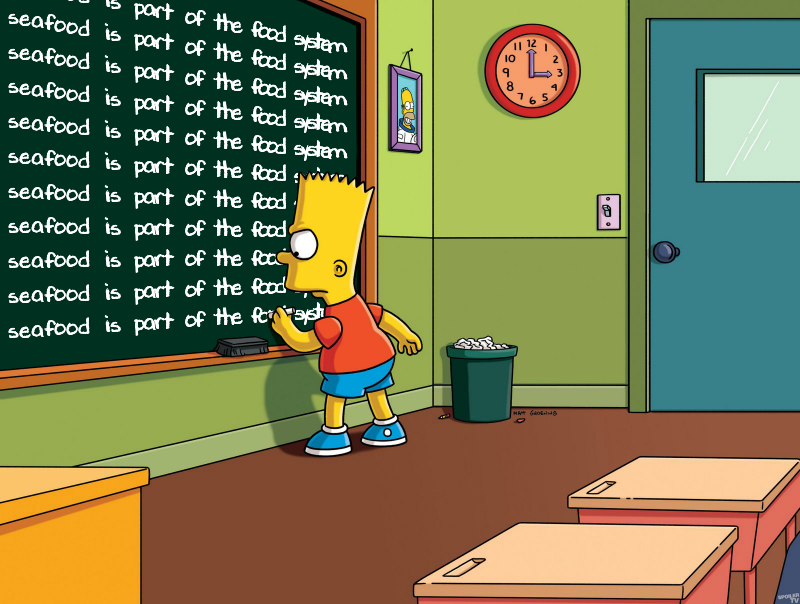Seafood is part of the food system
I made this meme at the start of grad school as a joke, but over the last year of studying it’s become very clear that it’s not all that funny.
This pandemic has turned our world into a virtual utopia, which means conferences and opportunities to hear from leading decision makers are now more accessible than ever. Unfortunately, all that’s meant for me is attending conference after conference and panel and after panel about global food systems and food security, each one seeming to have the same common theme: seafood is left out of the conversation.
Getting decision makers to recognize the importance of seafood to our global food systems has been the battle that I never expected. Growing up in a Portuguese household, the importance of seafood to food security and nutrition has always been obvious. Unfortunately, for most of North America, seafood has been and continues to be left out of vital discussions about food security and food systems.
Today, I attended a conference during which one of the sessions was dedicated to reviewing a draft report written about the impacts of COVID19 to Canada’s food industry. The 10-page report mentions fish and seafood exactly zero times. Not a single mention of seafood as part of Canada’s food industry even though the industry generates $6 billion annually to the Canadian economy and supports the nutrition and livelihoods of some of Canada’s most vulnerable populations, including Indigenous and rural communities.
It’s not as if the seafood industry was immune from the impacts of COVID19. I know because for the last 9 months my colleagues and I have been speaking with fisherfolk across the country and have produced 17 podcast episodes documenting the range of impacts they’ve experienced.
I was frustrated that this report, put together by some of the top minds in food research, blatantly ignored the importance of seafood yet again. But I was even more frustrated that I wasn’t surprised by it. Those involved in food security and global food systems research seem determined to keep seafood out of the discussion.
And it’s going to be the reason that our global food systems fail.
This pandemic has exposed the vulnerabilities of global food systems and seafood is no exception. However, it’s also exposed the opportunities and potential for regrowth and building back better. With climate change continuing to threaten food production and a growing population expected to hit 9 billion by 2050, it is plain stupid to not be turning to fisheries and aquaculture for solutions.
Globally, seafood is among the most consumed and traded foods in the world. It represents about 17% of the animal protein consumed globally. For communities in small island nations and the rural Arctic, fish can account for as much as 80% of the protein being consumed.
Fish are also a critical source of omega-3 fatty acids, vitamins and minerals, especially for the world’s poorest people. An equitable and accessible global food industry must include seafood.
Fish, in general, also have a much lower carbon footprint than products like chicken, beef, and pork. A climate-friendly global food system must include seafood.
A paper published this summer by Costello et al. highlighted the importance of seafood in feeding the global population. It highlights aquaculture, the largest growing food producing sector in the world, as having the greatest potential to address global food security in a sustainable way.
An excerpt from the abstract reads: “edible food from the sea could increase by 21–44 million tonnes by 2050, a 36–74% increase compared to current yields. This represents 12–25% of the estimated increase in all meat needed to feed 9.8 billion people by 2050.”
Not giving seafood a seat at the table during global food systems discussions leaves millions of people behind, and it limits the viable solutions. Simply put, it’s naive and reckless.
Thanks for coming to my TED talk.

